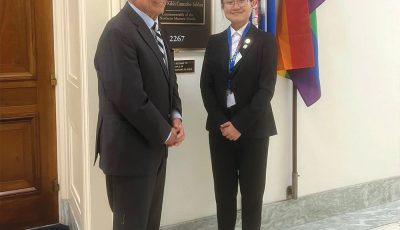New SIS headmaster re-imagines learning in digital age
After seven years as a teacher and dean at the Korean International School, Tim Bray returns to Saipan International School, where he once taught English, to be its new headmaster.
He replaces Dr. Dale Jenkins, the school’s headmaster for the last 10 years, who is retiring.
As headmaster, Bray said he would put to good use his familiarity with the islands, his love for the family he has found at the school, and his enthusiasm and ambitions for integrated technology in student learning and development.
“What I’d really like to see [SIS] do is become sort of a leader with technology integration in the classroom,” Bray said in an interview.
One online program that he said the school would be implementing via a federal grant is Achieve 3000.
“What Achieve 3000 does is for a content teacher, say in history, [to be able to access] a database of reading materials at different reading levels.”
Bray said this would help classroom instruction, especially in the private school setting where students are also English language learners.
“[A teacher is] able to go in and type in ‘U.S. Constitution and Bill of Rights’ and it pumps out a list of reading materials, at different ability levels, so he can take something very sophisticated and give it to his students who read at college level but he can take something very simplified and give it to his students who don’t read at that level, but they’ll be able to understand and participate in class and understand what’s going on rather than everyone gets the same thing at tenth grade reading level but you got half of the class who can’t understand it,” he said.
Bray said he welcomes the chance to pilot the program as one of his efforts to use technology and the Internet in classrooms.
He also cites its cost-effectiveness, highlighting his experience at KIS where one biology book costs around $115, but as an online material, with manipulatives, activities, and videos on top of written content, cost $30.
Most importantly, he said he wants to empower students to learn on their own, describing educators more as guides and facilitators of a student’s learning.
“[For a student] it’s a matter of finding the information and reading and processing the information in some way and being able to replicate it first and, after replication, being able to strike out on your own and use it in a creative way, in something different that nobody’s done before,” he said.
He pointed to TED Talks where he said a synergy of ideas and shared information can inspire teachers, engineers, and scientists into new ground.
Bray said he hopes to prod students to become independent learners as well as more collaborative workers as technology and the Internet pulls people to solve problems together.
“What’s going to be sustainable for the future and the job market is people need to be self-motivated and they need to feel empowered to learn on their own. The day of sitting in the classroom and another person basically regurgitating information to them and them regurgitating it back on the test is really over,” Bray said.
He described the job market now as ever-evolving and changing, and that students need to leave school with the skills capable to adapt to these demands.
“I know that the employment opportunities that my father had, when he was young in western Montana, don’t exist anymore. As the timber industry became smaller and smaller and more constricted, and it moved to places where trees grew a lot faster like Washington and Oregon, suddenly there weren’t any loggers in Montana,” he said.
According to Bray, these experiences in his home state taught him early on that one needed to have the skills to change, adapt, and overcome and learn something new.
His views carry over into the classroom as an educator, where he said he began to use technology in his first four years at SIS, despite some reluctance from his peers and initial difficulty.
However, according to him, he pursued his interests further as an ed-tech specialist helping teachers with technology at KIS, and as a graduate student, where he cites his professor Larry Creedon as an inspiration and mentor in his use of technology and the Internet in classrooms.
If not, he said, people are going to be out work.
“Here’s a guy who was 78 or 79, and he was using online message boards, using them to have class before class started, he was interacting with us before our class even began. He’d have us do work individually and put us into groups to let us discuss it,” he said.
According to Bray, his experience with Creedon encouraged him to prod his students to use technology in their learning and empowerment.
“The computer is not where the learning is, the learning is what we’re trying to solve, the problem we’re trying to fix. The computer gives us a wonderful tool to get there,” he said.



























